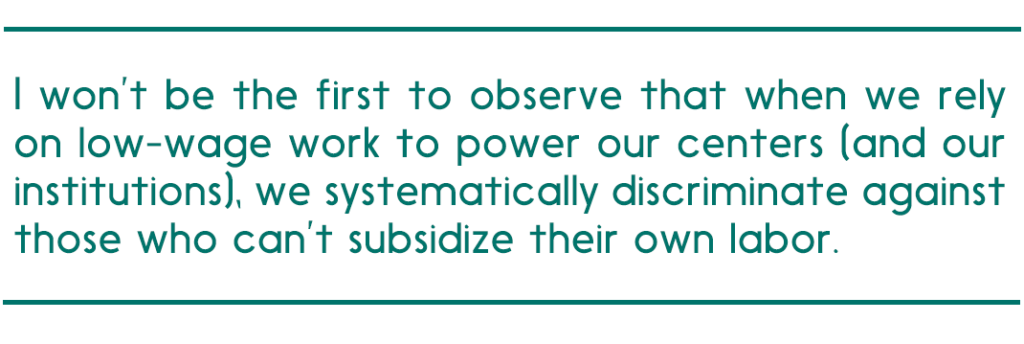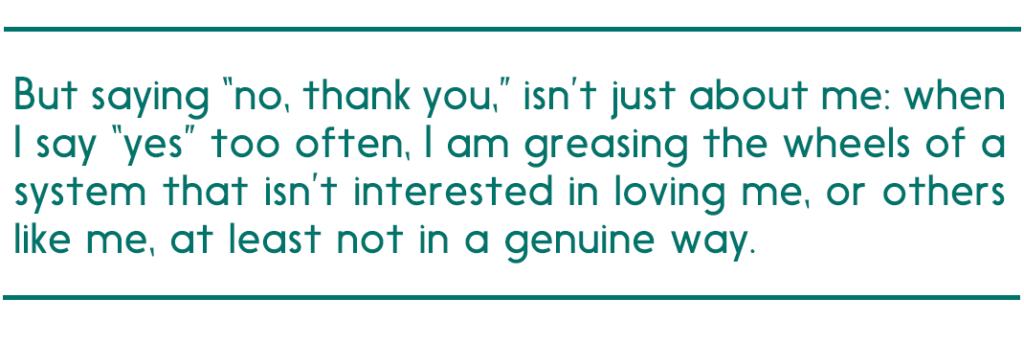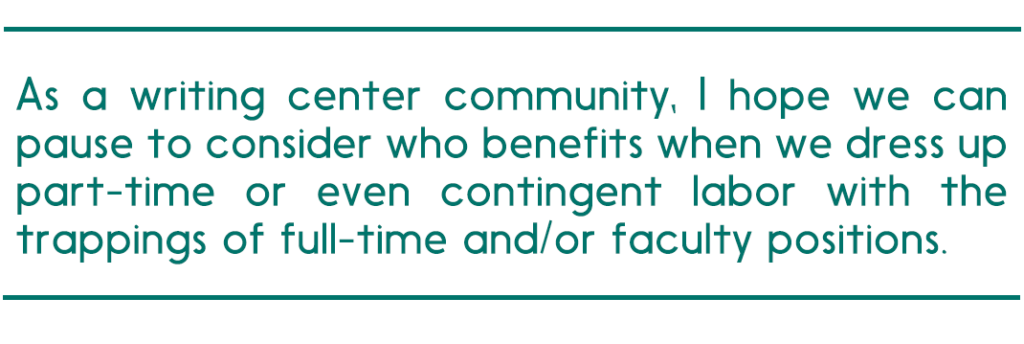By Molly Parsons, Keene State College
I am the assistant director of a writing center at a regional public college in the Northeast. My title, “assistant director,” is a recent upgrade (from “program assistant”) and an acknowledgment of my advanced degrees (I have a PhD in English and Education). The pay and terms of my position are otherwise unchanged—I am a part-time, adjunct staff member and earn the same salary and benefits (none) as I did before the title change. I occupy two distinct but conflated positions: I am both an academic (by job description) and an hourly, contingent employee (by pay and job security). I’m a veritable chimera: (1) a university-issued version of a mythic Greek hybrid; and (2) something that is wished for but doesn’t exist. My position is apparently hybrid but impossibly so. And I wish more people understood that.
The irreconcilability of my roles feels especially acute when I try to “engage with the field.”
I attended IWCA last fall—or I tried to. My kid was sick, so I was home. I don’t have access to a laptop through work, so I borrowed my spouse’s and sat on our bedroom floor. I had paid (out-of-pocket) to attend the conference and was really excited to engage, but at the end of the day, my conference experience amounted to a single “mentorship” session, where my work was judged of middling quality.

As I sat on the floor, on a borrowed computer, talking with someone about how my work was only okay—an experience for which I had paid handsomely—I had to wonder: What’s wrong with this picture? Here’s one thing: I was subsidizing my own labor. My participation in professional organizations, like IWCA, isn’t some intellectual high romance: I participate because, in some cases, conference work has made me better at my job. But if it weren’t for my personal investment (money for the conference fees; equipment for access; time away from my sick child), I wouldn’t have been able to participate. And maybe I shouldn’t have.
By subsidizing my labor in this instance—and in many, many others—I fear that I might be perpetuating a harmful illusion that people in positions like mine are “equal” members of our field and of our institutions who can and should be expected to participate and produce in equal measure. The harm is very often unintentional, as when, about once per semester, I am approached by faculty and administrators at my institution with an invitation to teach a course—but as an adjunct. As a “writing center” staff member, I am a particularly desirable plug-and-play option for writing-intensive courses, but I am also qualified to teach education and English courses.
Golden Goose Chase
I know, because my spouse is a tenure-track faculty member, how difficult it can be to find instructors for courses across our campus, which is located in rural New England—not a hotbed of off-duty advanced-degree holders. I have a Master’s and a PhD, and even while faculty and administrators approach me with goodwill, I know that I am not just a chimera but a golden goose. And, because I recognize that the time commitment far outweighs the compensation, I am becoming more practiced at tucking my head under my wing and politely demurring.

I am in a deeply fortunate position: my spouse is salaried and benefited, and we don’t need what little I could earn from teaching a course (or two or three). And even if we did need the money, my spouse would earn significantly more teaching the same course (by overloading) than I could by adjuncting. I’m the golden goose, I remind myself, as I continue to wait and hope that my institution will decide to offer me fair compensation for the work they clearly want me to do.

At the same time, I recognize that I am further privileged to hold my current writing center position which I very much enjoy. I love working with tutors, engaging in writing center research, and collaborating with my faculty colleagues. But, I can only do this work because my spouse can provide for our family. Think of the people who are necessarily excluded from positions like mine, simply because such positions are financially and personally unsustainable. I won’t be the first to observe that when we rely on low-wage work to power our centers (and our institutions), we systematically discriminate against those who can’t subsidize their own labor.
I know that when colleagues and administrators approach me with teaching opportunities, they do it with good intentions. They are expressing their faith in me as an instructor and are showing that they see me as a “colleague.” And I’ll admit it: it feels good that people in positions of power at my institution think that I might have something of value to contribute. But their offer is water from a poisoned well: the opportunity to do what they do for far less pay, no benefits, and no security. When this happens, it seems important to say, no, thank you.

Saying “no, thank you,” is an act of self-love. When I say no to additional work-work, I preserve my time for things I enjoy (painting, jogging, cooking, nature), and things I need to do (like laundry). If I’m not going to be paid like a full-time professional, I might as well take advantage of my uncompensated time. (These are the types of things I tell myself, as I rip myself away from my office, leaving a trail of unfinished work in my wake.) It’s a way of saying, “I’m worth more than you’re offering.”
But saying “no, thank you,” isn’t just about me: when I say “yes” too often, I am greasing the wheels of a system that isn’t interested in loving me, or others like me, at least not in a genuine way. That system says, “You belong! You’re valued! Colleague!” out of one side of its mouth while rescinding adjunct contracts out of the other. It’s a system that demands the full, round-the-clock devotion of its workers—intellectual and emotional—the return for which is often simply the privilege of participation.

Another time I said “No, Thank You”
Another time I said “no, thank you”: I recently interviewed for a writing center director position at another institution. I ticked off the boxes on the job call—I had the advanced degrees, years of experience, demonstrable teaching ability, and on and on. The interview process required a philosophy statement, a CV overhaul, a panel interview, and a campus interview. In other words, it was a LOT of work. It wasn’t until the final stage of the process, after I was offered the position, that the salary was made explicit (I had to ask). Although this was a director’s position, it was part-time, and the salary was less than I made as a middle school teacher fifteen years ago when adjusted for workload. The rigors of the interview process and the requirements in the job call spoke one message: this is a professional, intellectual, academic position. But the brass tacks revealed: this is a part-time, low-paid staff job.
While I recognize that a philosophy statement and multiple interviews are par-for-the-course for the academic job market, I have to wonder: is such an intensive process appropriate for a position that ultimately pays less than full-time work as a Team Leader at Target? As a writing center community, I hope we can pause to consider who benefits when we dress up part-time or even contingent labor with the trappings of full-time and/or faculty positions. Just because I apply for my position like a faculty member does not make me a faculty member. Just because I teach like a faculty member does not make me a faculty member. If the extra work I am asked to do is the same as the work done by faculty but doesn’t come with the extra pay, benefits, and stability accorded to faculty, the invitation to do that work is, at best, poor flattery, and at worst, exploitation.

I expect that many people in my position experience this kind of dissonance: we are fully-qualified members of our profession that are only able to fully participate if we subsidize our own work by paying for necessary materials, by relying on the support and assistance of family, by volunteering our time, by acting like academics while being paid like hourly employees. If I can’t be both, I think I might have the responsibility to do less—or to do only what is merited by my pay. When I try to will the chimera into existence, I help to perpetuate a system that operates, in part, by relying on the donation of time, money, and intellectual labor of other folks like me and excludes many others.
Molly Parsons, Ph.D. is the Assistant Director of the Center for Research & Writing at Keene State College. After teaching secondary English in Las Vegas, Molly earned her Ph.D. in English and Education at the University of Michigan. She’s a current member (a.k.a. happy worker bee) of NEWCA’s Steering Committee. Her research interests typically involve the ethics of writing center praxis and tutor development.



Great let them have it